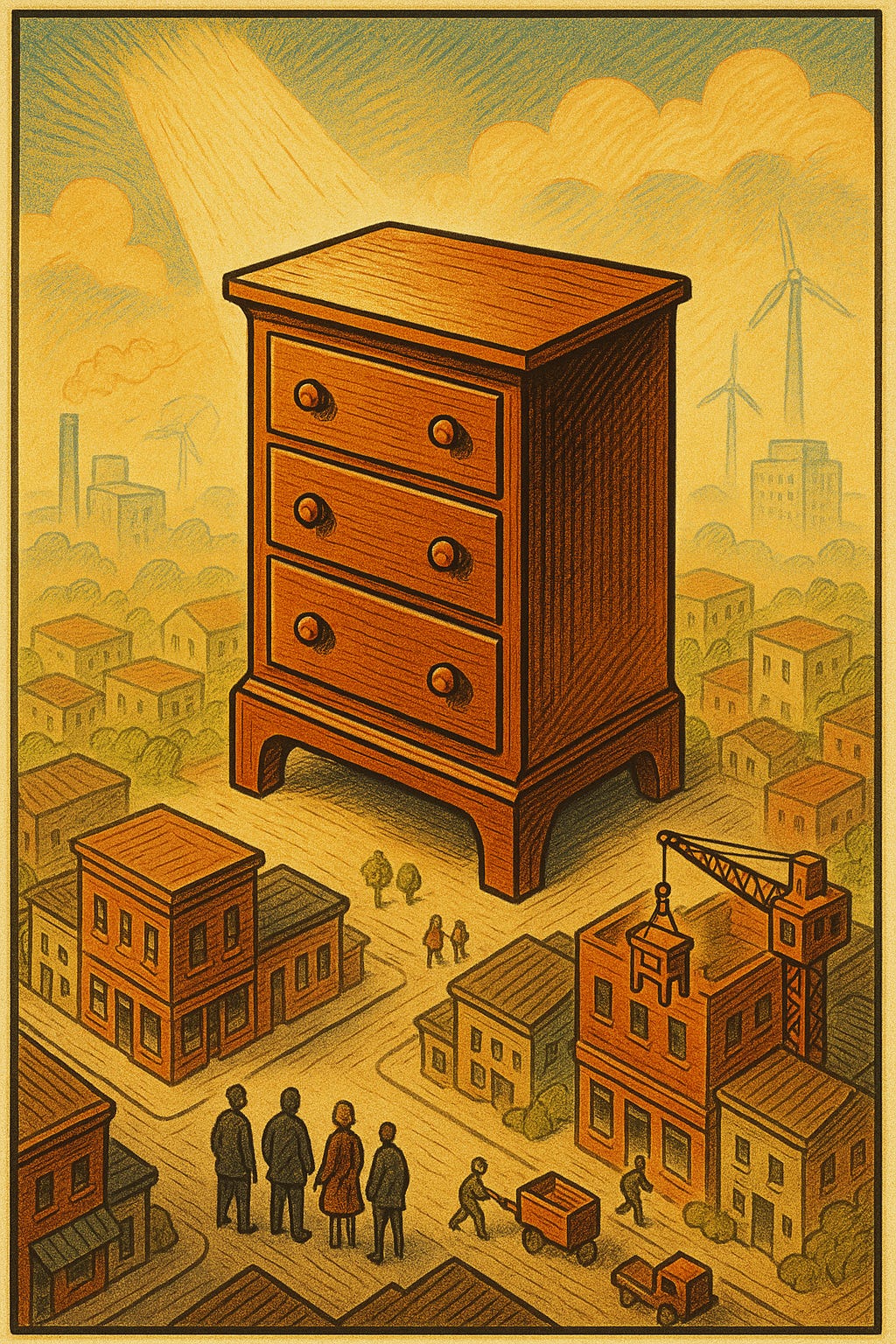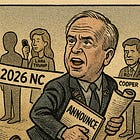What a giant dresser teaches us about N.C.'s economy
My stop in High Point helped me see more clearly about North Carolina’s economic development future
This past week I stopped in High Point on my way to talk N.C. politics with WGHP, and couldn’t resist pulling over to see the world’s largest chest of drawers.
It’s a quirky local landmark, sure, but it also got me thinking about the future of economic development in North Carolina.
We often describe High Point as once being the furniture capital of the world, like it’s a relic of a bygone era. But here’s the truth: In a world where companies can operate anywhere — or nowhere at all — the places that win are the ones that know who they are.
The future of economic development is about branding, and building an identity. It’s good to broaden High Point’s economic base, but you might get better returns if you double down on its strengths.
The message should be: If you want to work in furniture, you need to be in High Point. Not just twice a year for the High Point Market, but for good.
This type of approach is really starting to work in the Triad around aerospace, but you don’t need to be a major metro to lean in here.
I shot a quick video while I was there with a few more thoughts. Check it out on my new Instagram and Facebook page, where I’ll be sharing more videos and thoughts from across the state.
Quick hits
Everyone wants credit for North Carolina being No. 1 for business. But the data makes it clear: the Republican-led legislature deserves the lion’s share. I analyzed every CNBC ranking from 2007 to 2025 to trace how smart policy made North Carolina a national standout. Read my column here: Who really deserves credit for North Carolina’s ‘Best for Business’ honor
I also wrote about why the General Assembly is right to install guardrails for North Carolina’s cities — before we end up with our own Zohran Mamdani. Read it here: Republicans are right to save NC cities from themselves
You all know how big a fan I am of the Do Politics Better podcast. Last week, they had State Treasurer Brad Briner on the program, and he offered up an interesting analogy about the national debt.
He said to think of every $1 trillion of debt as a person being one pound overweight. With today’s national debt sitting at about $37 trillion, that’s like a person being 37 pounds overweight. A problem, to be sure, but not a catastrophe.
The heavier the person is, the more likely they are to develop health problems — but there’s no telling when exactly that happens. Could be at 30 pounds, could be at 100 pounds. I’m not sure I fully agree with Briner’s perspective here, but I love a good metaphor and this is one I’d never heard before.
At a premium
Important reads
Why Democrats are (still) bad at the internet (FWIW News)
Top spenders on social media last week
PBS dramatically ramped up its spending as the rescission bill makes its way through Congress. There was again no meaningful spend on YouTube this week.
Question of the week
Last week, I asked you who you would most support in a Republican primary for U.S. Senate. Lara Trump (27%) had a narrow plurality, with U.S. Rep. Richard Hudson (25%) close behind. Another 23% of you said someone else.
This week, let’s do a pulse check. Is Roy Cooper going to run for U.S. Senate next year? Now I’m leaning back toward yes, but I’d like to know what you think.




Gina, would you mind answering your questions for me? (i.e., Why would business want to invest in a state that...) It seems to me that will be a tough row to hoe since (a.) the starting point of the article is that NC was named #1 for business three out of the past four years, (b.) the chart indicates that NC has been in the top 5 in twelve out of the last fifteen years.
I would also appreciate it if you could expand on why you seem to be angry at Andrew. I don't think that he is arguing that businesses "want to" invest in NC. (It seems pretty clear they already have.) I don't want to speak for him, but I think Andrew is presenting what he believes is a cause and effect. In other words, Republicans did "this", and businesses did "that", wherein the "that" is flocked to (or invested) in NC. It seems to me that his positions are based on logic and reasonable inferences from the facts presented.
Gina, I don't think that your statements are entirely untrue (though I do believe they contain a wee bit of hyperbole). We have lots of room for improvement in education (all across the nation), making and keeping our water clean (ditto), and I find gerrymandering from both sides of the aisle reprehensible (double ditto). I don't think that any of those things are Andrew's fault, so maybe we could leave him out of this. I do, however, believe that policies which foster a stronger economy (read: encourage business investment) are a smart way to get to the point where we can all improve those areas where we need to. You and I probably have differing opinions in that regard, and I think that would make a much better basis for a discussion. Shall we?
Wow! Do you ever pander to the corrupt NC GOP! The NC republicans have done more to harm this state than to better it. We have dropped almost to the bottom in education. Why would business want to invest in a state that deprives its children of solid education? Why would business want to invest in a state that allows its drinking water to be polluted by hog waste and PFC's? Why would business want to invest in a state that gerrymanders its own citizens into dark holes of representation? Are you thinking of becoming a corrupt GOP politician?